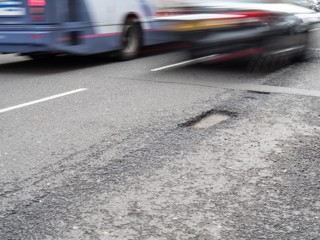Local road improvement schemes in England will receive a share of £100 million as part of plan to increase investment in infrastructure to help the economic recovery from the pandemic.
In a speech yesterday (Tuesday, June 30), the Prime Minister, Boris Johnson, confirmed 29 projects, ranging from fixing deteriorating roads and flood mitigation measures, through to repairing bridges that are part of local highway key routes, will benefit from the investment.
The funding, it says, will help improve some of our country’s most important A-roads, from the A58 by Bolton to the A38 running through Somerset.
Transport secretary Grant Shapps said: “As the country begins the recovery from Covid-19, we need to get on the front foot and invest in infrastructure in every region to reignite the economy, helping better connect people with opportunities in the future.
“By investing £100m in local roads and reaffirming our commitment to better connecting communities, we are not just talking about levelling up – but making it happen.”
Projects receiving significant investment include:
- £4.9m to repair two bridges in Sandwell to improve safety for nearby key roads in the West Midlands that will be used heavily during the 2022 Commonwealth Games.
- £5m each for plans to make the key route network in Liverpool more resilient, to begin further maintenance on the Swanswell Viaduct in Coventry, and for road maintenance on the Tadcaster Road in York.
- £4.9m to replace poor-quality footways for pedestrians in Sheffield, as part of the government’s commitment to improve people’s access to ‘active travel’.
- Boosting the quality of the A15, a key route providing a vital connection through the Humber region, with over £4.5m of investment.
The Government says it is committed to improving local journeys and ensuring the local road network is safe and reliable. More than £7.1 billion is being allocated to highway authorities in England outside London for highways maintenance from 2015 to 2021.
The 2020 Annual Local Authority Road Maintenance (ALARM) survey, produced by the Asphalt Industry Alliance (AIA), highlights that it would take 11 years and cost £11.1bn to bring the local road network up to a position from which it could be maintained cost-effectively going forward.
“Properly funding local authorities to carry out cost-effective, planned, preventative maintenance programmes would reduce future costs of more extensive repairs or replacement as well as encouraging cycling, cutting congestion and improving air quality,” explained AIA chairman, Rick Green.
“It makes sound economic sense too, as the DfT’s own commissioned research has shown that investing in local roads is an effective way to boost the economy, with significant additional spending on local roads potentially providing cost benefits of more than 4.5 times.”
FUNDING FOR RAIL
Network Rail has also been given £10m in design and development funding. The work will examine options to resolve capacity and reliability problems on the network.
The transport secretary also announced today that more than 50 bids have been received from across the country for a share of the Restoring Your Railways ‘Ideas Fund’. This marks the next step for the second round of the fund which will offer support to develop proposals to build or reopen lines and stations closed during the Beeching cuts, with the potential to level up regional economies and boost access to jobs and education.
Proposals for the restoration of lines and stations to re-connect their communities will now be considered by an expert panel including Network Rail Chair Sir Peter Hendy, with announcements regarding the successful schemes expected over the summer.
The Government has also announced it will work with devolved administrations to carry out a ‘connectivity review’, looking at how best to improve road, rail, air and sea links between our four nations.






















Login to comment
Comments
No comments have been made yet.